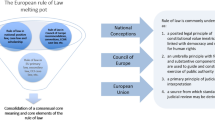Abstract
To end Europe's great cycle of religious wars, some early modern states imposed a secular ‘rule of law’ in spheres of life previously governed by religion. The following essay compares two instances of this basic fact of seventeenth-century European political history, one German and the other English. In these different religious and political settings, different juridifications were undertaken that do not reduce to manifestations of a single underlying process of social change. Considered in a legal-historical light, early modern juridifications therefore invite a clear disciplinary alternative to the socio-theoretical and socio-critical perspective on juridification associated with Jürgen Habermas. The larger challenge on behalf of legal history is to end the subordination of historical method to critical social theory.
Similar content being viewed by others
Author information
Authors and Affiliations
Rights and permissions
About this article
Cite this article
Saunders, D. Juridifications and religion in early modern Europe: The challenge of a contextual history of law. Law and Critique 15, 99–118 (2004). https://doi.org/10.1023/B:LACQ.0000035034.54275.fd
Issue Date:
DOI: https://doi.org/10.1023/B:LACQ.0000035034.54275.fd




